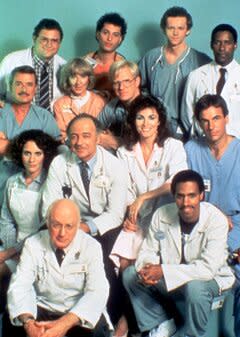'St. Elsewhere': About that snow-globe ending

NBC
There are oodles of ways to end a TV series. Marriage! Death! Birth! Flashforward! It was all a dream! Ambiguous cut to black! In 1988, though, St. Elsewhere truly shook things up and gave us one of the most talked-about series finales in history with "the snow globe." After watching six Emmy-nominated seasons of drama—medical and emotional, dark and light, envelope-pushing and heartstring-pulling—at the run-down St. Eligius, we were led to believe in the finale's last scene that the entire show was actually a product of the imagination of (construction worker?) Donald Westphall's autistic son, who was gazing into a snow globe containing a miniature version of the hospital.
EW gathered a dozen members of the cast for a photo shoot and asked them to reflect on the years they spent making this provocative, eccentric, beloved show, which you can check out in our third-annual Reunions Issue. Here on EW.com, read what each of them had to say about the daring and polarizing ending that helped define the WTF? sign-off. When you're finished, watch the cast reunion on Good Morning America and voice your own opinion on the finale in our poll.
CHAD ALLEN (Tommy Westphall): I remember the script arrived, I read it, got to the end, and I was stumped. I thought I knew what it meant, but it was so weird, especially for my younger mind, so I went running down the hallway and grabbed my mom and I was like, "You have to read this. Tell me if you think it means what I think it means!" My mom read it, and she looked at me sort of puzzled too and said, "I think it means it's all in your head?" I said, "That's what I thought it think it means!" So I knew that it was really cool, and I loved that. From the mind of a young person whose fantasies were coming to life before him, it was neat. I remember reading about it in the paper that there was controversy over it. As far as I could tell, there was always controversy around St. Elsewhere. It was a show that never did amazing in the ratings, but it held on because it was always pressing the boundaries of what was okay on TV, bringing up issues that weren't even being discussed…. At one point I was the answer for a Trivial Pursuit question. That's really cool for a teenager.
WILLIAM DANIELS (Dr. Mark Craig): I was shocked, actually. I had no ideas of their plans to do that. They needed a way to end the show… It was a provocative ending. A surprise to everybody. Some people liked its provocativeness. Other people didn't care for it at all. I think a lot of the cast didn't care for it at all. But they did want to end the show, and not have little St. Elsewheres coming after it.
BONNIE BARTLETT (Ellen Craig): [The writers] wanted to do an ending to the show in a way so that it could never be brought back again. They really wanted to kill the show. And they figured out a way: Okay, we won't have any reunions, nothing like that. And I was very upset. I thought it was terrible. A terrible ending!
DAVID MORSE (Dr. Jack "Boomer" Morrison): I felt two things. I felt one thing when I read it and one thing when I saw it. When I read it, I thought it was amazing: "Only these people could come up with this idea…" And I thought it was very touching. And then I saw it and I thought, "It's too much. It's just too big a leap. We can't take that jump from seeing these people, Norman, Ed [Flanders] and Bill [Daniels], and this young boy for six years, and suddenly we're supposed to believe that they're these other people. It's just asking too much from all of us." But I loved that they took the leap, and that was in the spirit of the show.
ERIC LANEUVILLE (Luther Hawkins): I look back on it now and say "Well, it kinda worked." When I first saw it, I had some real reservations about it. When we read it, we all had reservations about it. But [executive producers] Tom Fontana and John Masius and Bruce Paltrow didn't want just a normal ending. And listen, we set such a bar, it's hard to top it to make that ending satisfy a lot of people. If the show were not great, if we had not had as many nominations, we probably wouldn't even be talking about it. But because we set a bar, it was just hard to really top that… I wish I could say that I loved it. I didn't dislike it. I thought it was an interesting choice to make… I respect [the ambition]. And because I can't tell you I have a better idea of how it could've ended, I can live with that one.
CHRISTINA PICKLES (Helen Rosenthal): I have no idea what it means. But I thought it was wonderful. You can make up your own line what it means. It could've been 900 things, which is very clever because you were allowed to make up your minds so you could stay with your own fantasy so everybody could have an opinion. Then it could create conversation, so I thought it was kind of brilliant.

Lewis Jacobs/NBC
ED BEGLEY JR. (Dr. Victor Ehrlich): It was quite fitting for what they had done the previous six years. They always tried to be out there, beyond the limits of what was being done before. They tried to really think outside the box — the box in this case being that little television box of the '80s—and they did something so different. It was bold and shocking and upset some people. I was not upset. I went, "Wow. That is quite a choice." They did very unusual, bold things and did it regularly. You never knew what was going to happen next. It was highly unpredictable, just like every episode.
HOWIE MANDEL (Dr. Wayne Fiscus): I thought it was realllllllly interesting. We all knew that whenever you do the last episode of any series, the last chapter of any story like that, you're never going to come up with an ending that will satisfy everybody. I knew there would be an uproar. I was pretty happy with it. I thought it was ahead of its time, pretty ingenious and creative and not like anything else. But I wasn't surprised that there were many people who didn't find it satisfying. You can't please most people most of the time. You can barely please half the people most of the time.
MARK HARMON (Dr. Robert Caldwell): I didn't see it live. I sure heard about it. It made me laugh actually because it just is so like those guys. It made me smile when I heard about what they did because it was so them. They made a choice and the choice is interesting.
CYNTHIA SIKES (Dr. Annie Cavanero): Part of me likes that whole thing because it's sort of an Orson Welles-ian "Rosebud" [ending]. I hear people, like "Oh, what happened there?" or "Oh, I didn't understand that" or "Oh, I love that!" You got all kinds of comments on it. I thought it was interesting.
NORMAN LLOYD: (Dr. Daniel Auschlander): They'd been talking about Citizen Kane. I tell you, the last episode, I never bought it. I said at the time we were shooting, "This is a cheat." For me, it was a cheat. But for others, it was a stroke of inspiration. So you pick your horse and place your bet. I really had very little to say about that episode because I thought it was a letdown. We went through this experience and I wanted it to be maintained as a real one, not a dream…. I felt it wasn't serious. The great thing about the show that even in its comedy, it was serious. Even if you go to Alice in Wonderland, and he has the wonderful poem "Life is But a Dream" in it, still it was serious. This ending was not serious to me.
STEPHEN FURST (Dr. Elliot Axelrod): I thought it was kind of cool, actually. … My character died in the second-to-last episode, but I was in the last episode in a scene in which Howie's character pays a visit to Dr. Axelrod's corpse in the morgue. I was only supposed to be in 18 of the 22 episodes, so I got an extra episode's pay out of it. Howie goes to the morgue, slides me out, says something to me and pushes me back in. And Howie got so mad, because I got paid for a full episode, and all I had to do was lie on a slab for five seconds.
(Additional reporting by Jeff Jensen)
Related content:

